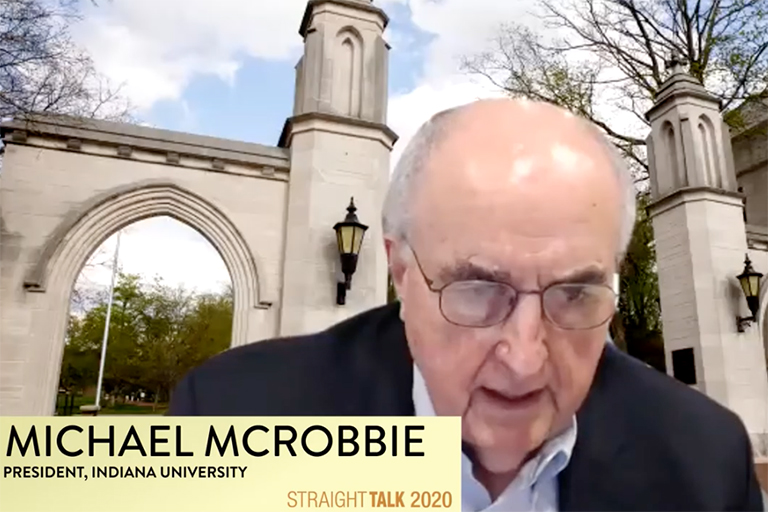Indiana University President Michael A. McRobbie said paper ballots and federal investment are crucial in modernizing states' election infrastructure. McRobbie made the comments during the Riley Institute at Furman University's "StraightTalk: Voting in America" series.
The Sept. 17 virtual event focused on safeguarding votes, voters and election integrity. McRobbie participated in the panel, along with Robert Costa, managing editor and moderator of "Washington Week" and national political reporter for The Washington Post; Ned Foley, director of the election law program and Ebersold Chair in Constitutional Law at The Ohio State University; and David Levine, elections integrity fellow at the Alliance for Security Democracy.
The discussion opened with McRobbie talking about his role as co-chair of a National Academies of Sciences, Engineering and Medicine Committee on the Future of Voting. The committee conducted a two-year study. The resulting report, "Securing the Vote: Protecting American Democracy", made several suggestions for safeguarding the integrity of U.S. elections. In addition to recommending the use of paper ballots, it highlighted federal investment as crucial in modernizing states' election infrastructure.
"What we found in this report was the quality of that infrastructure varies enormously across states," McRobbie said. "Some have done a very good job, some haven't. The only way that something approaching more uniform election infrastructure is going to be achieved is going to be by and through federal investment."
McRobbie also mentioned several other recommendations from the report, including using risk-limiting audits to determine whether election results reflect a correct tabulation of votes.
Moderator Teresa Nesbitt Cosby, associate professor of politics and international affairs at Furman University, asked McRobbie what challenges the pandemic poses for the upcoming election.
"I think clearly one of the stresses is obviously going to be concerning mail-in ballots to ensure that they arrive in time and that they are counted expeditiously," he said.
While "Securing the Vote" describes some concerns about mail-in ballots, they aren't regarding the integrity of the process. McRobbie said the rate of fraud with mail-in ballots is very small.
The pandemic presents additional challenges, McRobbie said, like ensuring polling places are setup in a way that ensures social distancing and regular sanitization, as well as recruiting enough poll workers.
One student submitted a question asking McRobbie about his prognosis for fair and free elections beyond November. McRobbie said that depends on the country investing in election infrastructure, and implementing several of the "Securing the Vote" recommendations.
"I think as long as progress is made in those areas, the public should have confidence in the integrity of the system," he said.


